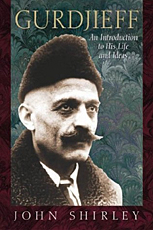John Shirley is a fiction writer who has been called "the post modern Edgar Allen Poe." He has written a screenplay and is well-informed about contemporary films and youth subcultures. In this substantive examination of the life and works of G. I. Gurdjieff (1866 - 1949), he plunges into the whirlwind careers of this master of crazy wisdom who supported himself as an impromptu entrepreneur, a professional hypnotist, and an importer of exotic rugs. As a spiritual teacher, Gurdjieff was a "rare bird" who unspooled his gifts over the years as a world traveler, a composer, a healer, a choreographer, and author of Meetings with Remarkable Men (a semi-autobiographical work) and Beelzebubb's Tales to His Grandson ( "a vast allegorical myth structure in a literary form all its own.")
Although Shirley doesn't explicitly make the comparison, he implies that Gurdjieff was a forerunner of system maker and Renaissance man Ken Wilber. His esoteric philosophy contained a detailed cosmology, a depth psychology, specific methodologies for increasing consciousness, a fusion of Western science and the wisdom of the East, a specialized brand of music, and "an intricate choreography of spiritually instructive dance." Shirley does a fine job assessing Gurdjieff's Fourth Way with its techniques of self-observation, breaking bad habits, and using attention as a tool of self-development.
Many other books are available on Gurdjieff from students and admirers, and Shirley lists many of them. His strong point is relating this unconventional spiritual teacher to the interests of contemporary youth culture — especially avid movie-goers. He also does a good job discussing Gurdjieff's impact on his many devotees including P. D. Ouspensky, Thomas de Hartmann, Alexander de Salzmann, Maurice Nicoll, A. R. Orage and many others. We also appreciated the many aphorisms of Gurdjieff sprinkled throughout the paperback. Here are a few:
• "Take the understanding of the East and the knowledge of the West and then seek."
• "The energy spent on active inner work is then and there transformed into a fresh supply, but that spent on passive work is lost forever."
• "Modern civilization is based on violence and slavery and fine words."
• "How awake are we, really? Is consciousness relative? People are asleep when they think they're awake. They sleepwalk through life. They live and die for the most part asleep, at best half-waking in fitful starts. If they think they're more awake than the next person, most of the time they're probably at least as deeply asleep."
• "Remember yourself always and everywhere."
